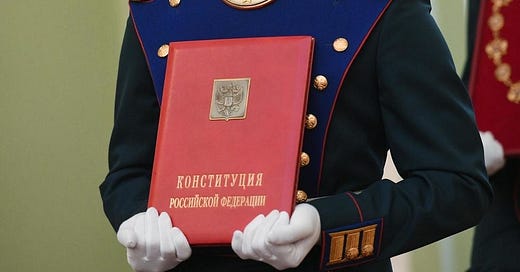Russia Recap: The latest in the power shakeup
Last week Putin announced a call for govt reforms, replacing members and proposing changes to the constitution... what's happened since?
Welcome back to another edition of the “From Russia With Mila” newsletter, where I cover Eastern Europe through the lens of journalism and the media industry.
Russian President Vladimir Putin proposed changing the constitution to take away power from the presidency and give more to the prime minister last week during his state of the nation speech (annotated version here: RFE/RL). Then, he replaced his prime minister, Dmitry Medvedev, with someone little known to the public — Director of the Federal Tax Service, Mikhail Mishustin. (More on the significance of this particular nomination —> Foreign Policy, The Guardian.)
This shakeup of the Russian government is seen by many as a move for Putin to stay in power past 2024 — which is when the next presidential election is… which he is ineligible to run in… since he is currently serving his second consecutive term of six years. (The constitution currently caps the presidency at two consecutive terms but does not limit amount of terms overall.)
Did anyone see this coming?
This is actually Putin’s fourth presidential term in total. He was prime minister from 1999-2000, president from 2000-2008, then prime minister again from 2008-2012, and he has been serving his current two consecutive terms as president since 2012. The Russian presidential term was four years until then-President Medvedev changed it to six in 2008.
And why did he do that?
Medvedev, who took over from Putin as head of state in May [2008], said the presidential term should go up from four to six years to allow more time to deal with massive challenges facing Russia and help the country move toward a stable democracy. (Reuters)
What did a Russian political analyst who monitors the political elite, Olga Kryshtankovskya, have to say about this back in 2008?
“In Russia, listen less to the words and look more at the reality… This is being prepared so that Putin can return for 12 years, so two six-year terms. The next presidential election is in 2012 so we could start speaking about the project Putin-2024.” (Reuters)

Dismissal of parliament and appointment of a new cabinet and PM… what’s next?
The Russian State Duma (lower house of parliament) began discussing Putin’s proposed amendments to the constitution Thursday, according to AFP. Largely Kremlin-loyal, the parliament is expected to fully back Putin on the amendment bill before going to a public vote.
Putin submitted the bill to parliament on Monday — just five days after forming a “‘working group’ of 75 people, including athletes and celebrities, to work on the amendments,” according to AFP. The group had only met twice, but as one of the members pointed out, the bill appears to have already been written in advance.
“I didn’t work (on the amendments),” Yelena Alshanskaya, who heads a major orphan charity, wrote on Facebook Tuesday. “Clearly our role is merely representative.”
The bill must be voted on by the State Duma, and then approved in the upper house of parliament, the Federation Council. Then, the Kremlin has to finally approve the bill with any changes made by parliament.
(Fun Fact: The chairman of the Federation Council is third in line to head the Russian government, behind the president and the prime minister.)

Putin: “Russia… needs strong presidential authority”
The parliament’s official website contains the amendments that are being voted on, including:
Instead of the president, parliament would confirm the prime minister, though the president can still sack any candidate.
Requirements for the post of president would be strengthened: permanent residency in Russia for at least 25 years and no other foreign citizenship or residency in other states ever — not just during the time of elections.
Instead of being forced to sign a bill adopted by a two-thirds parliamentary majority, the president would now filter it through the constitutional court, where he can dismiss any judge (and the # of judges on the court would shrink from 19 to 11).
Putin spoke in the Russian city of Lipetsk on Wednesday, saying that parliamentary republics in European countries have been “malfunctioning” and explaining that Russia “needs strong presidential authority,” according to AFP.
“He is creating an even more complicated system of authority,” said political analyst Gleb Pavlovsky (AFP).
Many are confused about where exactly the power will be residing within the Russian government after these amendments, but it is clear Putin will not be leaving the political sphere.
And that’s your update on the Russian government reshuffle! Reach out with any questions or comments, connect on Twitter for the latest, and stop back for more on media and Eastern Europe.
— Мила (Mila)


